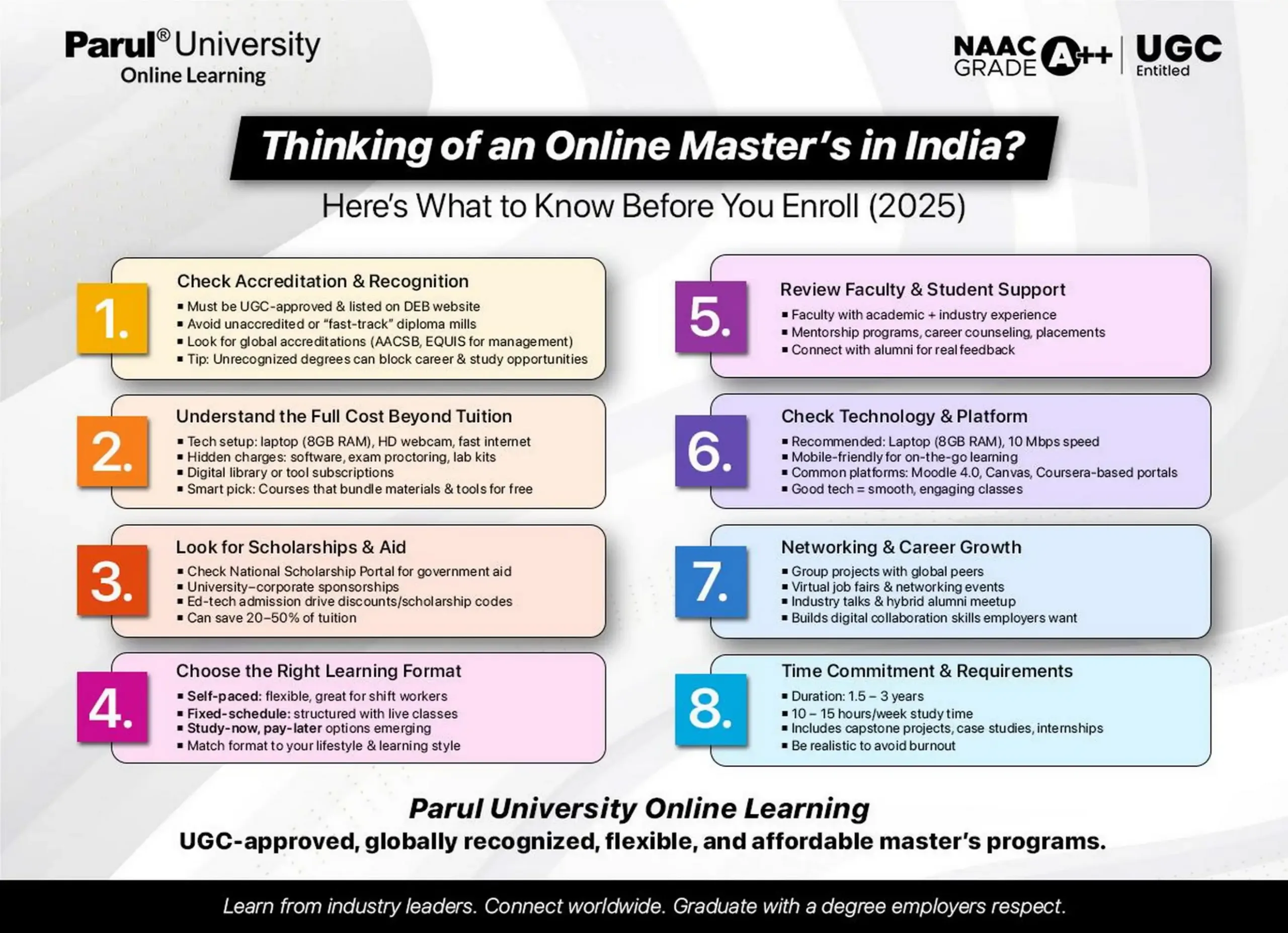8 Things You Must Know Before Enrolling in an Online Master Degree Course in India in 2025
Introduction
In 2025, more graduates than ever are turning to online master degree courses in India. The reason is clear: you study from anywhere, balance education with your work or personal life, and earn a degree that employers respect. If you are fresh out of college and want to control your budget, an online masters India program may look like the perfect fit.
The truth is, there is more to these programs than what promotional brochures highlight. To ensure your investment of time and money delivers the value you expect, you need to look beyond marketing claims.
Here are eight essential points you must know before starting your journey toward an online master’s in India.
- Check Accreditation and Recognition
- Your degree should open professional doors, not shut them. Always confirm if the university is UGC-approved and whether the course appears on the Distance Education Bureau (DEB) website.
- In India, the UGC-DEB list is your best reference for legitimacy.
- When exploring international options, look for global accreditations such as AACSB for business programs or EQUIS for management schools.
- Avoid unaccredited institutions or “fast-track diploma mills” that promise quick degrees without rigorous academic work. Graduates from such programs often face challenges when applying for jobs or higher studies.
- Example: A marketing executive once shared how her unrecognized MBA blocked her from applying to a leadership program abroad, forcing her to start over with an accredited course.

- Understand the Full Cost Beyond TuitionThe tuition fee is only the starting point. You must factor in other expenses such as:
- Hidden charges for software licenses, exam proctoring, or lab kits
- Costs of essential technology, like a capable laptop, HD webcam, and stable high-speed internet
- Subscription fees for digital libraries or premium tools if not included in the program
A smart choice is a program that bundles learning materials, e-libraries, and industry-standardware at no extra cost. Some online master’s courses in India provide free access to ing platforms worth thousands of rupees annually.
- Look for Scholarships, Grants, and AidIn 2025, financial support for online students is more accessible than ever.
- Explore the National Scholarship Portal for government-funded options
- Check if your university partners with corporate sponsors for merit- or need-based discounts
- Watch for scholarship codes during admission drives on ed-tech platforms
These options can reduce costs by 20-50%, making an online masters in India far more affordable.
Example: A working IT professional secured a 30% tuition waiver through a tech-company partnership with an accredited university saving nearly ₹80,000 over two years.
- Choose the Right Learning FormatThe flexibility of online learning is its greatest strength, but formats differ.
- Self-paced programs let you study anytime; ideal if you work shifts or have unpredictable schedules
- Fixed-schedule programs with live classes are better if you thrive on deadlines and classroom interaction
- Study-now, pay-later models are emerging, allowing you to start without paying the full tuition upfront
Consider your personal routine and learning style before deciding.
- Review Faculty Credentials and Student SupportQuality education depends on the curriculum and the experts delivering it.Look for faculty who bring both academic excellence and industry experience. A management program taught entirely by professors with no real-world exposure might leave gaps in your practical knowledge.Also, evaluate the university’s support ecosystem:
- Mentorship programs
- Placement assistance
- Career counselling and workshops
Connecting with alumni on LinkedIn can give you unfiltered feedback about how effective the program is in delivering career outcomes.
- Check the Technology and Platform UsedYour classroom is virtual, so the platform matters as much as the syllabus.
- Recommended setup: Laptop with at least 8GB RAM, HD webcam, and 10 Mbps internet speed
- Mobile-friendly learning systems allow you to attend lectures while commuting or travelling
- In 2025, common platforms include Moodle 4.0, Canvas, and custom university portals based on Coursera technology
Smooth, intuitive platforms improve focus, while outdated systems cause delays and frustration.
- Focus on Networking and Career GrowthAn online master’s program in India should offer more than just classes; it should expand your professional network.Look for programs that:
- Facilitate group projects with peers from different countries
- Organize virtual job fairs and online networking events
- Offer industry talks or alumni meetups in hybrid formats
Employers now value the digital collaboration skills gained during online learning. The ability to work with teams across time zones is a sought-after skill in global industries.
- Understand Time Commitment and RequirementsFlexibility in online education does not mean reduced workload.
- Most online master’s degrees require 1.5 to 3 years for completion
- Expect to invest 10-15 hours weekly if you are studying full-time
- Many programs include capstone projects, case studies, or virtual internships as graduation requirements
Conclusion
Choosing the right online master degree course in India can be a smart career move if you choose carefully. Accreditation, affordability, strong faculty, effective technology, and professional networking opportunities are critical.
Do thorough research before enrolling. Compare program details, read alumni reviews, and align your choice with your long-term career goals. The right program can be your launchpad to leadership roles, international opportunities, or entrepreneurial success.
Take the next step toward a future-proof career with Parul University Online Learning. Explore our UGC-approved master’s programs designed for flexibility, affordability, and global recognition. Learn from industry leaders, connect with peers worldwide, and graduate with a degree that employers value. Enroll today to start your journey toward academic and professional excellence.





